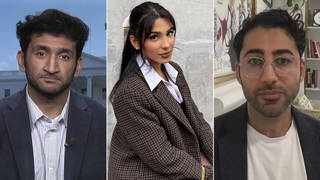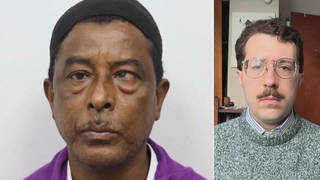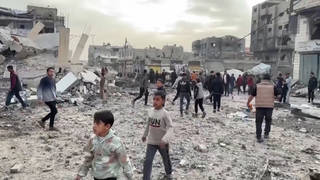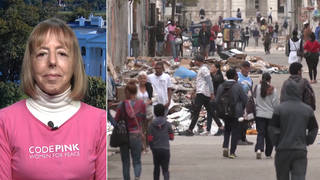
Topics
Guests
- Victoria RoseBritish senior plastic and reconstructive surgeon with the National Health Service.
We speak with Dr. Victoria Rose, a British plastic and reconstructive surgeon who has been on three medical missions to Gaza since the start of Israel’s war on the territory. She joins us from Nasser Hospital in Khan Younis, where she’s been treating patients for over a week, and describes horrific injuries amid Israel’s ongoing bombardment, limited medical supplies and widespread malnutrition making it harder for people to heal. “Children are particularly taking the brunt of this,” she says. “It’s the worst it’s ever been.”
Transcript
AMY GOODMAN: We’re going to turn right now to Gaza, go directly to Gaza. This is Democracy Now!, democracynow.org.
NERMEEN SHAIKH: Israel’s military has intensified its attacks on the Gaza Strip, killing at least 51 Palestinians since dawn. Gaza’s Health Ministry reports Israel bombed three electric power generators and fuel storage tanks at the besieged Indonesian Hospital in northern Gaza. They’ve also surrounded Gaza’s Al-Awda Hospital. With Israel’s latest attacks, only 19 of Gaza’s 38 hospitals are still operating, albeit at severely limited capacity.
AMY GOODMAN: We go now to Nasser Hospital in Khan Younis, where we’re joined by Dr. Victoria Rose, a British senior plastic and reconstructive surgeon with the National Health Service. She’s been on three medical missions to Gaza since October 2023. We’re talking to her on the day, this week, after it’s been announced by Britain that they’re going to pause trade talks with Israel, given what is happening in Gaza right now.
Dr. Victoria Rose, tell us what’s happening there. What are you finding?
DR. VICTORIA ROSE: So, we arrived about just — well, we arrived on the 13th of May, and we’ve been working at Nasser Hospital in Khan Younis since the 15th. As you said, it’s not my first trip, so there’s some comparisons here. But the main thing that’s different, really, is the state of the population. I mean, it’s very clear that we’re dealing with a completely different patient population now.
These people haven’t had any food in since the 2nd of March. They are malnourished. The children are particularly taking the brunt of this. They are all a lot shorter than their Western counterparts. That’s always been a problem from their chronic malnutrition, but they are very, very thin. We are having a lot of problems with wound healing, because, obviously, if you’re not getting enough nutrients and vitamins, your cells are not turning over in a timely fashion, and you can’t heal your wounds. On top of that, we are having dire problems with infection. This is related to the malnutrition, but also related to the situation that the people are in. They are living in tents. It’s dirty. We’re running out of clean water. Israel has stopped the vaccination programs. It’s the worst it’s ever been.
NERMEEN SHAIKH: And, Dr. Rose, if you could say, you know, what kinds of injuries are you seeing most often, and particularly on children?
DR. VICTORIA ROSE: So, they’re all blast and bomb injuries. And there’s a couple of — well, there’s two types of wounds that you see from a bomb going off or an explosion. The first is a burn from the heat of the explosion. And we’re seeing some huge burns, 40, 50% burns in children, the sort of burns that are very rarely survivable in the U.K. When we have all of our intensive care colleagues around us and specialist hospitals, we still have problems supporting children with this size burn in the U.K., so you can imagine what that burn is like over here.
The other injuries that we’re seeing are due to the penetration of the missiles. So, what happens in a blast is, whatever is around you, either the local masonry or a car or whatever was blown up with you, is ejected at a very high speed, and it hits the civilians like a missile. This will either penetrate the head, chest or abdomen, and if it does that, you’re unlikely to survive. If it penetrates a limb, you’re likely to survive, and you’ll be brought to the hospital. What we’re seeing is traumatic amputations of hands, fingers, feet, toes, legs, arms. And what isn’t amputated is severely destructed. So we are trying to piece together bones, patch missing bits of skin, nerves are damaged — really, really severe injuries.
NERMEEN SHAIKH: So, Dr. Rose, you’re describing these severe injuries on a large number of children, but you’re also working with very little medicine. If you could, you know, explain how you’re doing this surgical work with access to such little, such few anesthetics?
DR. VICTORIA ROSE: Yeah, I mean, the main thing that we’re low on at the moment is antibiotics. We ran out of Augmentin, or co-amoxiclav, which is the most standard antibiotic that we use in these type of injuries. And we’re down to a very weaker substitute, ceftriaxone, which we don’t actually use in the U.K. now. And that’s our real problem, is that we’re not giving adequate antibiotics to these people. We just don’t have them.
NERMEEN SHAIKH: And, Dr. Rose, you know, Nasser Hospital is not far from the fighting. Could you talk about your concerns about a possible forced evacuation, and, if such were to occur, where the patients at Nasser would go?
DR. VICTORIA ROSE: Yeah, we’re checking the IDF website, which is IDF.il. And if you’re in Gaza, it picks up your location immediately. And they’ve gridded the entirety of the strip. We are basically a grid away from the active fighting, so about four streets, about a K and a half from the evacuation zone.
We had dire problems on Tuesday when that zone was announced, in that quite a lot of my team had to leave me to go and evacuate their families. My anesthetist today, on Tuesday, walked 20K with his 5- at 6- and 8-year-olds to evacuate them from where they lived in east Khan Younis, into al-Mawasi, which is the humanitarian zone. So we had a real problem with staff on Tuesday.
But our main issue is we are the last standing hospital in the south of Gaza. The European Gaza Hospital was taken on Wednesday of last week, and the only other hospitals around us are field hospitals. So, there are some good field hospitals. There’s the UK-Med, ICRC, MSF Belgium. There’s also the Jordanian and the Kuwait Hospital. But they are all tents. These are all tent hospitals that don’t have any ICU capacity, and they don’t have any generated oxygen. The only standing hospital around us is the Palestinian Red Cross Society, but that’s part tents, and that, again, doesn’t have an ICU, and it can’t generate its own oxygen.
So, if Nasser closes, we have a huge issue on our hands, because we have an adult ICU and a pediatric ICU, and we have nowhere to send these patients. Anyone here at the moment that’s dependent on oxygen is also at risk. If Nasser closes, hundreds of patients will die.
AMY GOODMAN: Let me ask you, Dr. Rose, if news of what’s happening in the outside world is coming to you. In a moment, we’re going to talk to the former Labour leader of Britain, Jeremy Corbyn. But the fact that Israel’s staunchest allies — well, U.K., your own country, where the prime minister, Starmer, has said that the suffering of the innocent children being bombed again is utterly intolerable. And we’re going to speak with an EU representative, where the European Union is also putting pressure on Israel. Does that make a difference? And what are you ultimately calling for?
DR. VICTORIA ROSE: It has made a difference. It does feel like, finally, our voices are being heard. But it is a shame that it comes so late, and I think we need a little bit more action than what we’re seeing.
Really what we need is an end to this enforced blockade. As I said, we haven’t had any aid or any food in since the 2nd of March. And the nine trucks that came in yesterday are still parked in Israeli territory in Gaza, and the Palestinian trucks have not been allowed to pick them up. So, it’s really dire. I think we need to put the politics aside here. It’s a humanitarian crisis, and Israel has got to open the borders to let food in, to let medical aid in and to let aid workers in. And then, you need to let us work safely.
AMY GOODMAN: I want to thank you, Dr. Victoria Rose, for being with us, British senior plastic and reconstructive surgeon with the National Health Service, has been on three medical missions to Gaza since October 2023. My final question is: Your colleagues and yourself, why do you put yourself in this incredibly dangerous situation, where hundreds of health workers, doctors, nurses have been killed, have been imprisoned?
DR. VICTORIA ROSE: It’s difficult to understand unless you come here and see the difference that you make. We always worry when we come here that we might not be of any use, that we might get all our kit confiscated, that we might not have a hospital to go to. But what we always say is the main thing is to come here to bear witness, because you’re not seeing what I’m seeing, because there’s been a complete block to all media. So I’m here, number one, to bear witness.
Number two, I’m here to stand with my colleagues. And these are people that I worked with before this war started. And every time I come, they are so pleased to see me. And they need a break, and I’m an extra pair of hands, and it makes a huge difference.
And thirdly, it’s one case at a time, but I’m definitely making a difference, and I know we’ve saved some lives.
AMY GOODMAN: Dr. Victoria Rose, we want to thank you so much for joining us from Khan Younis in Gaza — Khan Younis, the second-largest city in the Gaza Strip.
This is Democracy Now! When we come back, we look at how criticism of Israel is growing in Europe as the U.K. pauses trade talks and the EU reviews its relationship with Israel. Then we’ll go to South Africa, a day after the South African president meets with President Trump at the Oval Office, and President Trump charges white genocide, as the president of South Africa says that’s a conspiracy theory, that’s not true. Stay with us.
[break]
AMY GOODMAN: “Greed” by Sweet Honey in the Rock in our Democracy Now! firehouse studios years ago.












Media Options